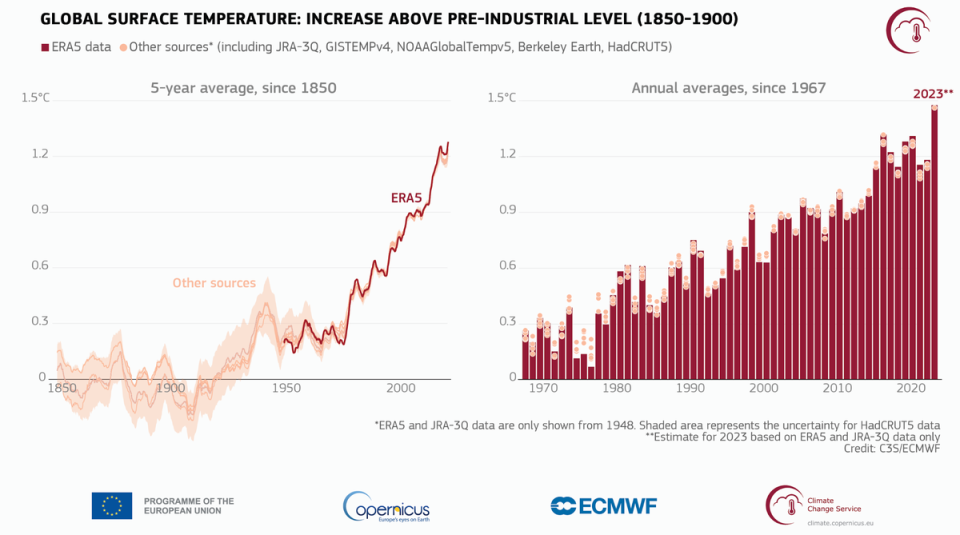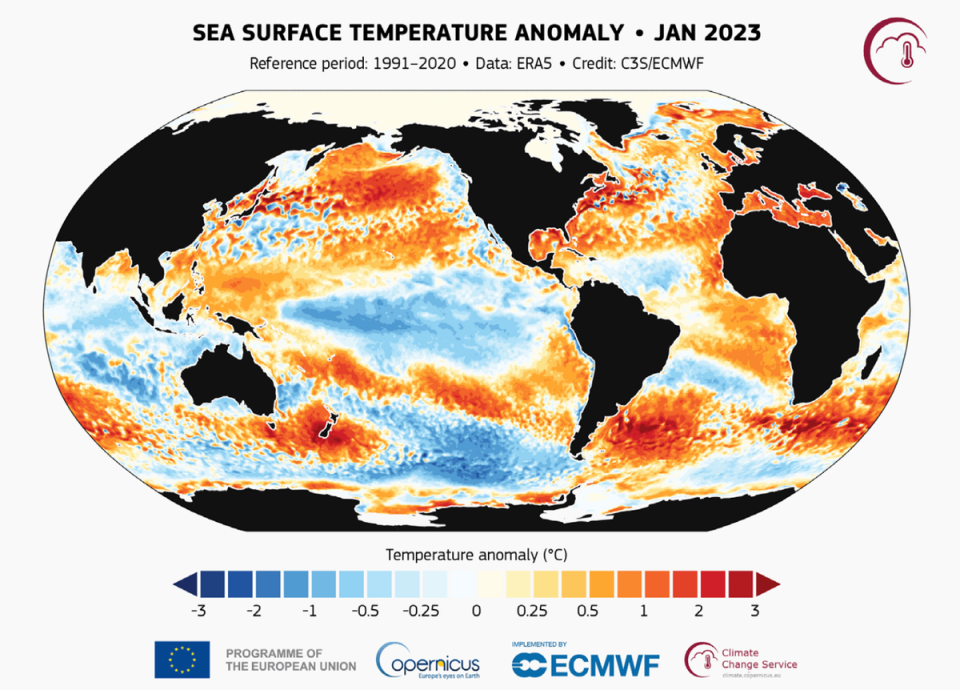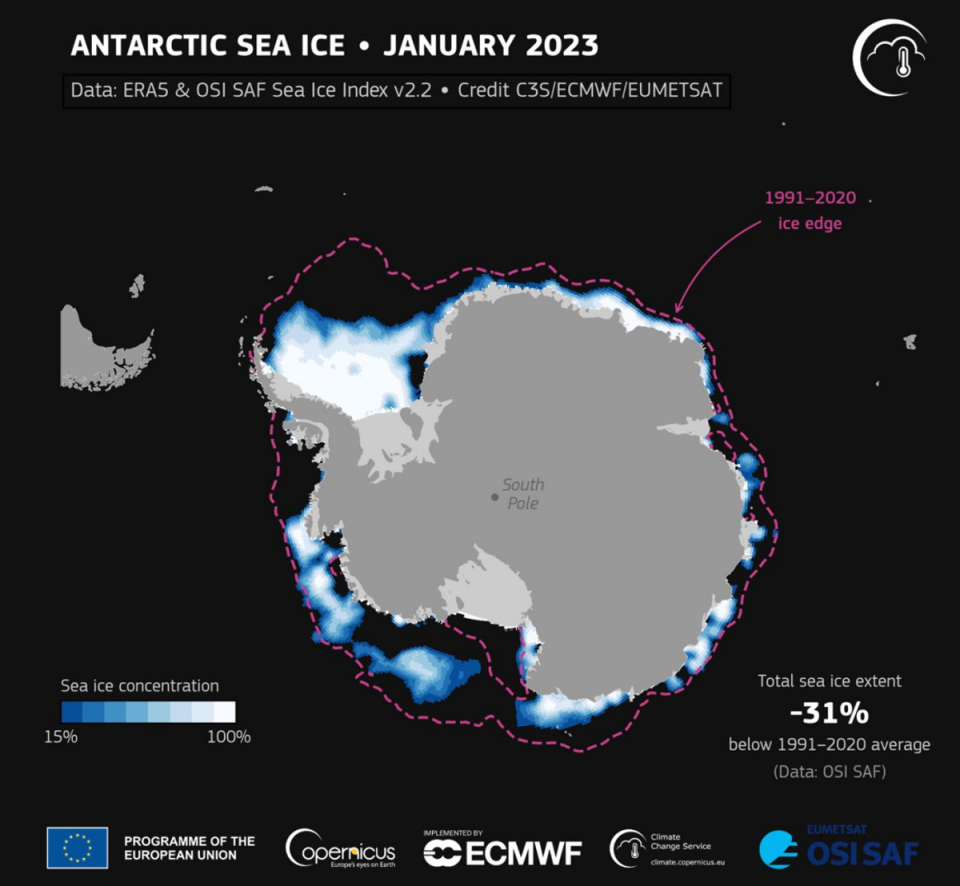2023 confirmed as hottest year ever as climate records ‘tumbling like dominoes’
The findings are hardly surprising, but a global gut-punch nonetheless: 2023 has been confirmed as the hottest year on record “by a large margin”.
For the first time, every day of the year was 1C hotter at a global level than the pre-industrial era, the EU’s climate change service Copernicus said.
Nearly half the days in 2023 breached 1.5C (2.7F) – the temperature goal set by the global Paris Agreement to stave off the most harmful consequences of the climate crisis. This was the case for just over 20 per cent of days in 2016, the previous hottest year.
In November, another barrier was broken. Two days that month measured more than 2C above pre-industrial levels for the first time – surpassing the upper warming limit of the Paris deal.

The findings do not mean that the Paris Agreement has failed, as the deal is based on temperature changes over 20-year periods. But it sets a “dire precedent,” Copernicus warned.
The record-breaking nature of 2023 was both “inevitable” – as a result of continued climate warming and El Nino, a recurring natural phenomenon that influences temperature and weather patterns, Copernicus said. El Nino emerged in spring 2023, and played a role, but it “does not explain all of the increase in ocean surface temperatures at a global scale”.
The year also experienced “additional unforeseen factors – some of which are still under scientific investigation”.
It has now been suggested that 2024 could be even hotter than 2023, with forecasts showing that this year could end with an average temperature more than 1.5C above the pre-industrial baseline.


Other scientific groups, including Berkeley Earth and the Met Office, are similarly expected to report 2023 to have been the hottest year.
“The extremes we have observed over the last few months provide a dramatic testimony of how far we now are from the climate in which our civilisation developed,” said Carlo Buontempo, director of the Copernicus Climate Change Service.
“This has profound consequences for the Paris Agreement and all human endeavours.”
Deputy director Samantha Burgess said that temperatures last year are likely to have exceeded those of any period in at least the last 100,000 years, adding: “2023 was an exceptional year, with climate records tumbling like dominoes.”
The analysis found:
The global average temperature in 2023 was 14.98C – 0.17C higher than 2016, making it warmer “by a large margin”
July and August 2023 were the warmest two months on record
Global ocean temperatures were “persistently and unusually high” from April to December, leading to historic marine heatwaves around the world including in parts of the Mediterranean, the Gulf of Mexico, the Indian Ocean, and the North Atlantic
It was a “remarkable” year for Antarctic sea ice – reaching record lows in eight months
The Copernicus report summarised 2023’s worst climate extremes and what’s driving them – primarily the continued rise of greenhouse gas emissions from burning fossil fuels.
Concentrations of carbon dioxide and methane in the atmosphere reached record levels in 2023, researchers found.

The hottest year on record led to a cascade of extreme events across the planet. Emissions from wildfires in 2023 increased by 30 per cent from 2022, in large part a result of the hundreds of blazes that raged across Canada. Wildfires also severely affected southern Europe, South America, Australia and Hawaii.
Other regions suffered extreme drought, including Mexico, Argentina, the Amazon basin and west Africa. Heatwaves descended over southern Europe, north Africa, and parts of North America and Asia.
Autumn brought a steady march of powerful storms, accompanied by heavy flooding. The impact of Storm Daniel devastated the city of Derna, Libya, in September, while storms Babet and Ciaran caused severe problems in October in northern and western Europe.
At least 12,000 people were killed by floods, wildfires, cyclones, storms, and landslides globally in 2023, according to analysis from Save the Children, around a third more than in 2022.

 Yahoo News
Yahoo News 
